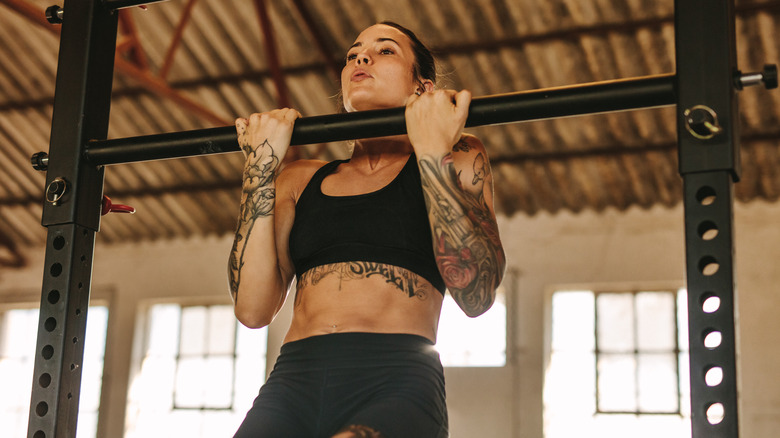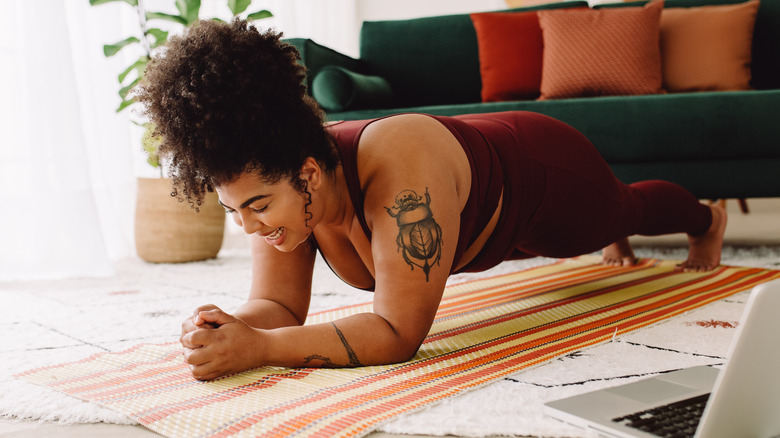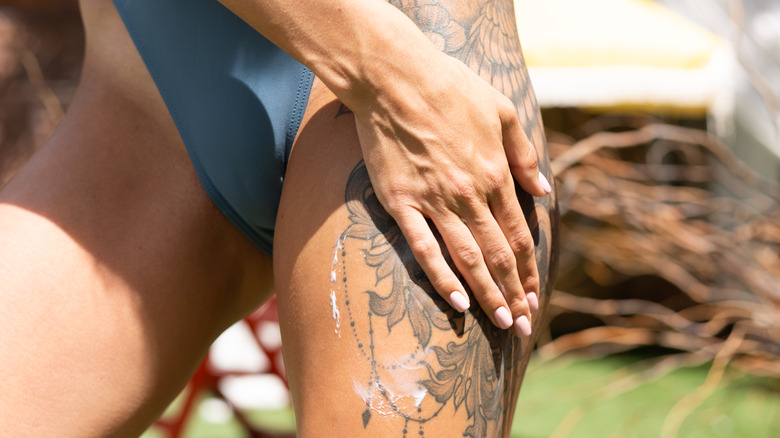Can Muscle Gain Negatively Impact Your Tattoos? Here's What To Know
Tattoos are more popular than ever. While generations before shied away from inking themselves, older Zoomers, Millennials, and the younger Gen X crowd are all about them. According to a 2023 survey by Pew Research Center, 46% of U.S. adults ages 30 to 49 have at least one tattoo, while the same can be said for 41% of those between 18 and 29. With 32% of all U.S. adults rocking at least one tattoo, it's safe to say tattoos are officially mainstream.
Although tattoos are having their moment, some people don't fully realize they require some upkeep. If they're not taken care of, tattoos can fade, bleed, and even become distorted. As much as it might make sense that weight gain and loss can affect the appearance of a tattoo, so can muscle growth, per Livestrong. But while that's the case, it's a bit more complicated than a blanket "yes" or "no" as to how muscle gain can negatively impact your tattoos.
Why muscle growth can affect tattoos
Tattoos are only skin-deep. Underneath we have muscle, fat, bones, and all the rest of our innards. When people work out a lot, especially if they're looking to gain muscle, then naturally the muscles increase in size which can cause the skin to stretch. However, you'd really have to bulk up very quickly in order to see a significant change in the appearance of your tattoos, per Healthline. Average muscle gain over a reasonable amount of time isn't very likely to change your tattoos in any way that's going to have you running to your tattoo artist to have it fixed.
But where muscle gain could create a problem with your tattoo is if it results in stretch marks. According to the American Academy of Dermatology Association, stretch marks are scars that appear when the skin's collagen and elastin are ruptured by quick expansion or shrinkage of the epidermis. Depending on one's skin tone, stretch marks can be pink, white, purple, or brown. That being said, if you gain muscle and get stretch marks that happen to be where you have a tattoo, their color and/or texture could possibly negatively affect it, per Stories & Ink. However, the severity would depend on the color, shape, and size of the tattoo, as well as the color and size of the stretch marks.
How to prevent possible negative impact
While it can't be stated enough that the impact, if any, is minimal with muscle gain, should you want to be proactive in prevention, there are two ways to go about it. First, consider tattoo placement. Some parts of the body stretch more than others, which could possibly play a role in a tattoo becoming distorted. According to Adrenaline Studios, lower legs, upper chest and back, forearms, and ribs are the spots that are less prone to stretching. This is something to consider if you're thinking about getting a tattoo either prior to or while you're in the middle of your muscle gains era.
But if you've had your tattoos for years and now you're looking to gain muscle, you can further limit your chances of disrupting your ink by moisturizing the area. "To minimize tattoo distortion, in any case honestly, would be to moisturize," tattoo artist Jaz Paulino told Byrdie. "Moisturizing the skin is so important in general, but especially if your skin is experiencing some elasticity in either direction. To support the skin being stretched, whether it be weight loss or gain, pregnancy, etc. just be sure to moisturize your body with what works best for you." Moisturizing, too, can possibly lower the risk of stretch marks, but there's no guarantee, per Medical News Today.
Ultimately, if you're concerned about your tattoos becoming distorted, muscle gain shouldn't be at the forefront of your mind. The biggest culprit when it comes to messing up ink is excessive sun, via Ink Nurse. So slathering on the SPF should be at the top of your list when it comes to tattoo protection.


